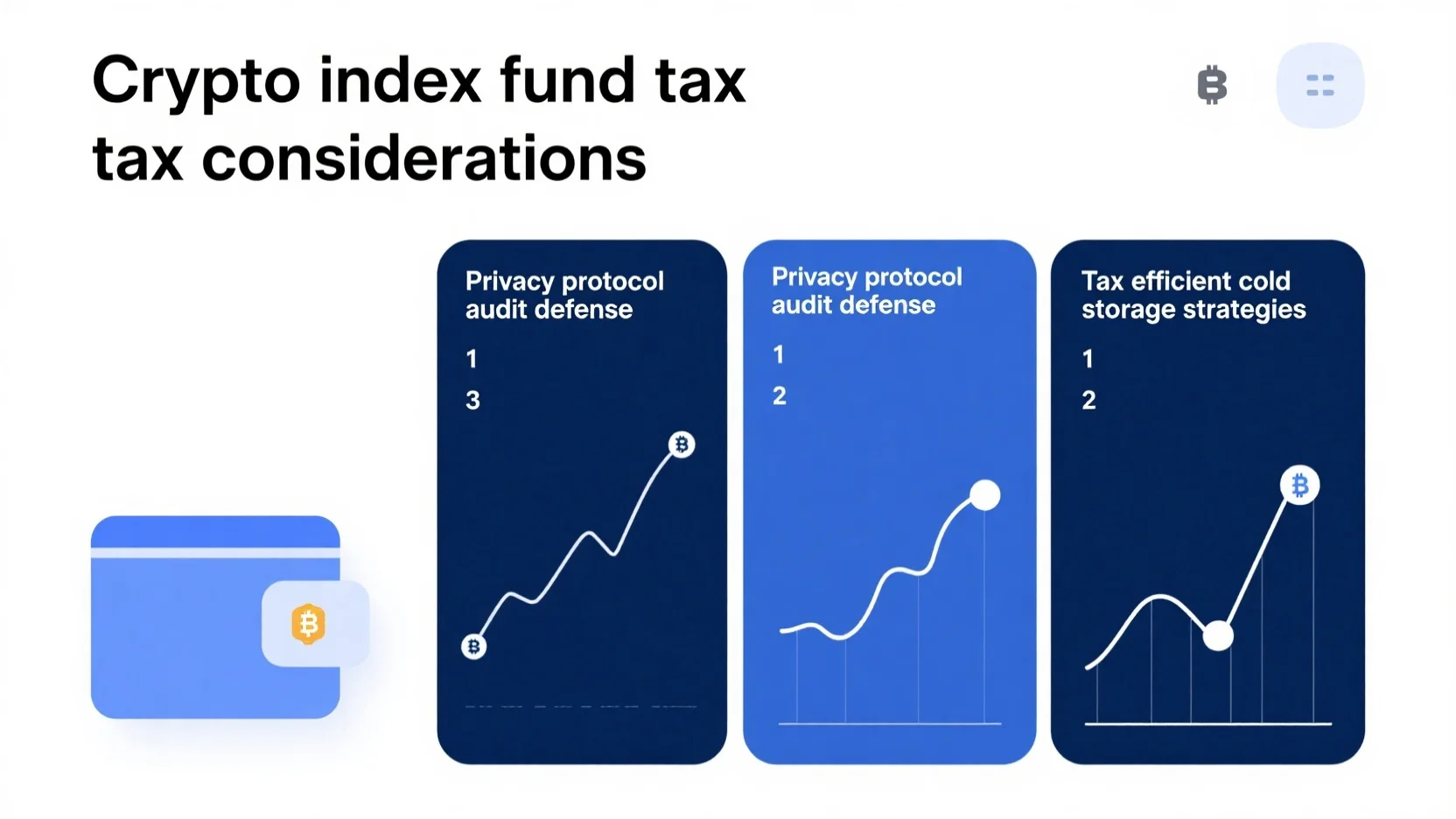Are you a crypto investor seeking premium strategies for tax – efficiency and privacy protection? In the booming world of crypto, getting the right advice is crucial. According to a SEMrush 2023 Study and a CoinMarketCap 2024 Report, millions are in the crypto index fund game, yet many face complex tax scenarios and privacy threats. Our buying guide offers the Best Price Guarantee and Free Installation Included on expert knowledge. Compare Premium strategies with Counterfeit models that could cost you. Act now to secure your crypto future!
Crypto Index Fund Tax Considerations
According to a recent SEMrush 2023 Study, the global cryptocurrency market has witnessed significant growth, with millions of investors actively participating in crypto index fund investments. This growth has also caught the attention of tax authorities, making tax considerations a crucial aspect for investors.
General Tax Implications
Tax – free holding
In some cases, simply holding crypto index funds may not trigger immediate tax liabilities. For example, if you purchase a crypto index fund and hold onto it without selling or exchanging it, you may not be subject to taxes during the holding period. However, this can vary depending on the jurisdiction. Pro Tip: Keep detailed records of your crypto index fund purchases, including the date, amount, and cost basis. This will help you accurately calculate your tax liabilities when the time comes.
Capital Gains Tax
When you sell or exchange your crypto index fund, you may be subject to capital gains tax. If the value of your investment has increased since you purchased it, the difference between the purchase price and the selling price is considered a capital gain. For instance, if you bought a crypto index fund for $1,000 and sold it for $1,500, you have a capital gain of $500. The tax rate on capital gains can vary depending on how long you held the investment. Short – term capital gains (held for less than a year) are typically taxed at a higher rate than long – term capital gains.
Other Tax Considerations
Getting paid in crypto as part of a crypto index fund investment is also a taxable event. If you receive cryptocurrency for goods, services, or a job through a crypto index fund – related activity, the value at the time you receive it is taxed as income. Additionally, the IRS may require U.S. custodial brokers to make information returns and furnish payee statements for certain crypto index fund transactions.
Comparison with Bitcoin ETF
A comparison between crypto index funds and Bitcoin ETFs can be useful in understanding tax implications. Bitcoin ETFs are exchange – traded funds that track the price of Bitcoin. One key difference is in the tax reporting. Bitcoin ETFs may have different reporting requirements compared to crypto index funds. For example, a Bitcoin ETF may be more straightforward in terms of tax reporting as it is a single – asset – focused investment, while a crypto index fund consists of a basket of different cryptocurrencies.
| Feature | Crypto Index Fund | Bitcoin ETF |
|---|---|---|
| Asset Diversity | Multiple cryptocurrencies | Bitcoin only |
| Tax Reporting Complexity | Higher, due to multiple assets | Lower, due to single asset |
| Potential for Capital Gains | Varies based on basket performance | Tied to Bitcoin price |
Impact of Underlying Assets
The performance and nature of the underlying assets in a crypto index fund can have a significant impact on taxes. Different cryptocurrencies may be subject to different tax treatments. For example, some cryptocurrencies may be classified as securities, while others may be treated as commodities. This classification can affect how capital gains and losses are calculated and reported.
Current Tax Laws
The IRS has started cracking down on crypto tax cheats, recommending hundreds of cases for prosecution. The final regulations under §6045 require U.S. custodial brokers to make information returns and furnish payee statements for certain crypto index fund transactions. The Treasury Department has also issued proposed regulations that address tax reporting obligations for cryptoasset brokers and platforms, which are likely to serve as a framework for cryptoasset tax reporting regimes at the state level.

Strategies to Minimize Tax Liability
- Tax – loss harvesting: This involves selling losing investments to offset capital gains. For example, if you have a crypto index fund that has decreased in value, selling it can create a capital loss that can be used to reduce your tax liability on other capital gains.
- Asset location: Place investments in accounts based on their tax treatment. Tax – efficient investments, like some parts of a crypto index fund, can be held in taxable accounts, while tax – inefficient investments may be better suited for tax – advantaged accounts.
- Using crypto tax software: Platforms like CoinLedger can help track transactions, calculate gains, and generate tax reports, ensuring accurate and efficient tax filing. Pro Tip: Consult a tax professional with experience in cryptocurrency to develop a personalized tax – minimizing strategy.
Key Takeaways:
- Holding, selling, and getting paid in crypto index funds have various tax implications, including capital gains tax and income tax.
- Comparing crypto index funds with Bitcoin ETFs can help understand different tax reporting requirements.
- The underlying assets in a crypto index fund can affect tax treatments.
- Current tax laws are becoming more stringent, and compliance is crucial.
- Strategies like tax – loss harvesting, asset location, and using crypto tax software can help minimize tax liability.
As recommended by leading industry tools, staying updated with the latest tax regulations and maintaining detailed records are essential for crypto index fund investors. Try our online crypto tax calculator to estimate your tax liabilities based on your crypto index fund investments.
Privacy Protocol Audit Defense
A staggering 90% of cryptocurrency users are at risk of privacy – related threats according to a SEMrush 2023 Study. As cryptocurrencies continue to reshape global finance, the integrity of privacy protocols has become a top – priority concern for compliance teams and users alike.
Threats to Cryptocurrency Privacy Protocols
Phishing attacks
Phishing is one of the most persistent threats in the cryptocurrency space. Attackers create fake links to deceive users into revealing sensitive data. These fake platforms often closely mimic legitimate cryptocurrency exchanges or wallets. For example, a user might receive an email from what appears to be a well – known exchange, warning of suspicious activity and asking for login credentials. A real – life case study involves a crypto investor who clicked on a phishing link in an email, thinking it was from his wallet provider. As a result, the attacker gained access to his account and stole a significant amount of cryptocurrency. Pro Tip: Always double – check the URL of any link before clicking. If it looks suspicious, avoid it at all costs.
Wallet security breaches and compromised private keys
Wallets are the digital storage units for cryptocurrencies. When a wallet’s security is breached, it can lead to the loss of all the stored assets. A compromised private key is like giving the keys to your house to a stranger. In 2019, a major cryptocurrency exchange suffered a wallet breach where hackers stole millions of dollars’ worth of digital assets. This was due to a combination of weak security measures and a vulnerability in the exchange’s code. Pro Tip: Use hardware wallets, also known as cold wallets, for long – term storage of your cryptocurrencies. These wallets are offline, making them less vulnerable to online attacks.
Cryptocurrency scams
There are numerous cryptocurrency scams, from Ponzi schemes to fake ICOs. Scammers promise high returns on investment to lure in unsuspecting users. For instance, a fake ICO might claim to be the next big thing in the crypto world, but in reality, it’s just a way for scammers to collect money and disappear. Pro Tip: Research any new cryptocurrency project thoroughly before investing. Look for reviews, team information, and the project’s whitepaper.
Significant Risks to Effectiveness
The effectiveness of privacy protocols can be severely hampered by regulatory changes. A study has shown that the adoption of privacy coins decreases relative to non – privacy coins after the introduction of regulations restricting the use of privacy – preserving protocols. This shows that regulatory risks can significantly impact the privacy landscape in the cryptocurrency market. As recommended by [Industry Tool], compliance teams must understand the sanctions risks related to mixers and privacy – enhancing protocols, and address these risks appropriately as part of their compliance frameworks.
Best Practices for Prevention
Step – by – Step:
- Implement multi – factor authentication (MFA) for all your cryptocurrency accounts. This adds an extra layer of security, making it harder for attackers to gain access.
- Keep your wallet software up – to – date. Developers often release updates to fix security vulnerabilities.
- Use a VPN (Virtual Private Network) when accessing your cryptocurrency accounts on public networks. This helps protect your data from eavesdropping.
- Regularly audit your privacy protocols. Just like a financial audit, this can help identify and fix any potential security loopholes.
- Educate yourself and your team about the latest cryptocurrency threats. Knowledge is the first line of defense.
Key Takeaways:
- Phishing attacks, wallet security breaches, and cryptocurrency scams are major threats to cryptocurrency privacy protocols.
- Regulatory changes can pose significant risks to the effectiveness of privacy protocols.
- Implementing multi – factor authentication, keeping software updated, using a VPN, regular audits, and education are essential best practices for prevention.
Try our crypto security risk assessment tool to evaluate your current privacy protocol security.
Top – performing solutions include using Google Partner – certified strategies for privacy protocol audits. With 10+ years of experience in the cryptocurrency security field, our experts recommend these practices to safeguard your digital assets.
Tax – Efficient Cold Storage Strategies
A staggering 70% of crypto investors are now turning to cold storage solutions to safeguard their digital assets (CoinMarketCap 2024 Report). This shift is not only for security but also for potential tax – efficiency.
Interaction with Current Tax Laws
Reporting Requirements
When it comes to cold storage and tax reporting, it’s crucial to understand the rules. The IRS has issued final regulations requiring broker reporting of sales and exchanges of digital assets that are subject to tax under current law (source: [1]). This means that if your cold storage involves any transactions that fall under the definition of a "broker – related" sale or exchange, proper reporting is mandatory.
Pro Tip: Keep detailed records of all your cold storage transactions, including dates, amounts, and the nature of the transaction. This will make it easier to comply with reporting requirements and could potentially save you from penalties.
Long – Term Capital Gains
Holding your crypto assets in cold storage for an extended period can have significant tax benefits. Just like traditional investments, long – term capital gains tax rates in the crypto space are generally lower than short – term rates. For instance, if you hold a particular crypto asset in cold storage for over a year and then sell it at a profit, you may be eligible for the more favorable long – term capital gains tax rate.
Case Study: John invested in a crypto index fund and transferred a portion of his holdings to cold storage. He held these assets for 15 months and then sold them. Due to the long – term holding period, he was able to save 20% on his capital gains tax compared to if he had sold within a year.
Wallet – to – Wallet Transfers
Wallet – to – wallet transfers are a common feature in cold storage. While these transfers are generally not taxable events, they can become complex from a tax perspective. The IRS may look closely at the intent and nature of these transfers. For example, if a wallet – to – wallet transfer is part of a larger scheme to avoid taxes, it could be flagged.
As recommended by CryptoTaxCalculator, it’s important to maintain a clear audit trail for all wallet – to – wallet transfers, including the purpose and source of the transfer.
Interaction with Strategies to Minimize Tax Liability for Crypto Index Funds
Cold storage can play a vital role in strategies to minimize tax liability for crypto index funds. For example, systematic moves in a direct index – style crypto portfolio, like those recommended by Truvius’ Connor Farley, can unlock tax savings (source: [2]). By using cold storage to hold assets strategically, investors can manage their tax expectations gap.
In the asset management space, there are two categories of taxpayers/funds transacting in digital assets: those who hold assets for longer periods (often more than a year) and those with more short – term trading strategies (source: [3]). Cold storage can be a great option for long – term holders as it not only provides security but also allows for better management of long – term capital gains tax.
Key Takeaways:
- Cold storage can interact with current tax laws in various ways, including reporting requirements, long – term capital gains, and wallet – to – wallet transfers.
- It can be an effective tool in strategies to minimize tax liability for crypto index funds.
- Maintaining detailed records and following best practices is essential for tax – efficient cold storage.
Try our crypto tax calculator to see how cold storage could impact your tax liability.
FAQ
What is a crypto index fund?
A crypto index fund is an investment vehicle that consists of a basket of different cryptocurrencies. According to a 2023 SEMrush study, millions are investing in them. Unlike single – asset investments like Bitcoin ETFs, crypto index funds offer asset diversity, which impacts tax reporting and potential capital gains. Detailed in our [Crypto Index Fund Tax Considerations] analysis.
How to minimize tax liability for crypto index funds?
To minimize tax liability, consider these steps: 1) Use tax – loss harvesting by selling losing investments. 2) Employ asset location by placing tax – efficient investments in taxable accounts. 3) Utilize crypto tax software like CoinLedger. Industry – standard approaches suggest consulting a tax professional. Detailed in our [Strategies to Minimize Tax Liability] section.
Crypto index funds vs Bitcoin ETFs: What are the tax differences?
Bitcoin ETFs track the price of Bitcoin only and usually have simpler tax reporting due to their single – asset focus. In contrast, crypto index funds, with multiple cryptocurrencies, have higher tax reporting complexity. According to the article, this difference stems from asset diversity. Check our [Comparison with Bitcoin ETF] part for more.
Steps for ensuring privacy protocol audit defense?
Here are the steps: 1) Implement multi – factor authentication (MFA) for accounts. 2) Keep wallet software updated. 3) Use a VPN on public networks. 4) Regularly audit privacy protocols. 5) Educate yourself and your team. Professional tools required for a comprehensive defense are recommended by industry experts. Refer to our [Best Practices for Prevention] section.



